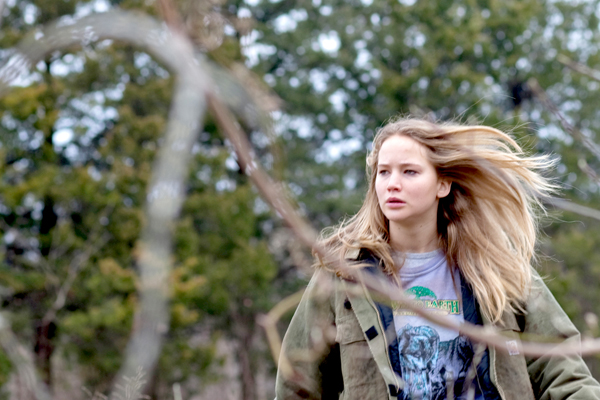|
Reviews of Recent Independent, Foreign, & Documentary Films in Theaters and DVD/Home Video

WINTER’S BONE Nothing says rural like the many cutting reminders of humanity in all its weakness. Drugs and alcohol, wizen faces, babies. The opening scenes of Winter’s Bone are largely expositional, working hard to establish Ree Dolly (Jennifer Lawrence) as the caretaker of a catatonic mother and two young siblings with a missing, meth-cooking father who, if he skips bail (as it’s looking like he may do), will forfeit the family home and property to an unsympathetic bondsman. In the Missouri sticks, indifference is the name of the game as the exposition continuously reveals. Ree’s the victim of her father Jessup’s failures, and at 17, she’s only just starting to realize the complexity of his dealings. Information that comes as a surprise to the audience is also news to Ree. Likewise, not only is a teenager forced to grow up quickly in Winter’s Bone, but an audience may walk away feeling that same effect. The inescapable browns and grays of this backwoods setting prove the value of shooting on location, where there’s just no substitute for acres of centuries-old timberland, decrepit shacks that dapple the weedy hills, and piles of burned out tractors and autos that seem to have sprouted roots in the unkempt yards. Ree’s brief tour of the high school, one with which she has presumably long since parted ways, reveals a home economics lesson on caring for newborns and, in the gym next door, ROTC drill practice. The elements that feel out of place in this depressing backwater—like the outdoor trampoline hearkening back to better family times—are reminders of a more familiar, homogenized American suburbia, which only rarely manage to filter into this rural void. Make no mistake. This is still America, where private ownership takes precedent over social welfare. By virtue of this, Jessup is able to stake his home, and the livelihood of his entire family, on a bail bond. In Ree’s search for Jessup, the film is more than your run-of-the-mill mystery. She may be up against a cast of rough and tumble cousins—methamphetamine junkies all—but what’s important here is that she’s also up against an unsympathetic American judicial system. Deadwood regular John Hawkes plays Ree’s uncle, Teardrop. In a story this loaded, amid a setting this steeped in Deliverance-esque detail, the cerebral work of both Hawkes and Lawrence is magnetic. The two steal the show, and, with few exceptions, make the rest of the cast look like it was fleshed out with stagehands. In a film like this, nailing a Southern accent isn’t the only requirement to playing a character in Ozark country. Lines too often feel flat, threatening the seams of director Debra Granik’s carefully constructed reality. A suspenseful (if uneventful) sequence at a cattle auction, the Gummo chic of a squirrel gutting scene, and the sheer wonder at Jessup’s fate are more often what keep us engaged. Granik and screenwriting partner Anne Rosellini don’t miss too often, though. When the grit becomes a little too much to take, there’s always another interesting piece of writing that keeps us on board. For instance, when Ree’s relentless search becomes repetitive, Teardrop enters and adds a new dynamic to the family struggles, and Granik is wise enough to allow a musical sequence to continue slightly longer than it’s needed for the story. It’s this kind of attention to the overall shape of the film that elevates it. However,
the ending is troublesome. Ostensibly, it’s a happy one, though that
might not be the problem. Something feels too neatly wrapped up, as if
too many loose ends are resolved. Granik has
fashioned something of a genre film, and perhaps the neat resolution is owed after the
difficulty of Ree’s situation. As she sits with her young brother and sister,
it's back to the status quo.
They are still dirt poor and their mother incurably ill. Both the law
and their suspicious cousins watch them closely, and Ree’s prospects for
the future don’t look any better than before. If this makes a happy
ending, I suppose we’ve a lot to consider.
Michael Lee
|

